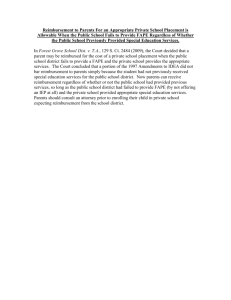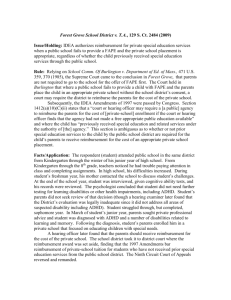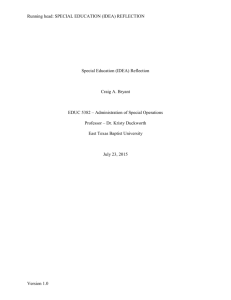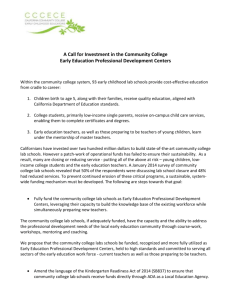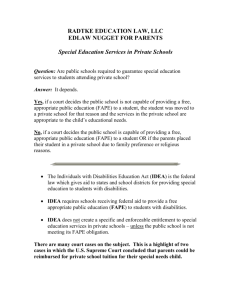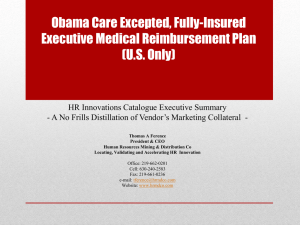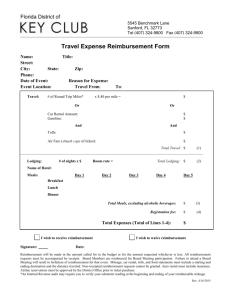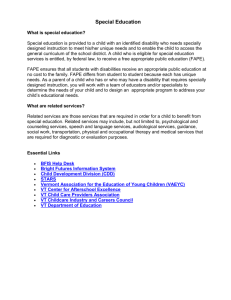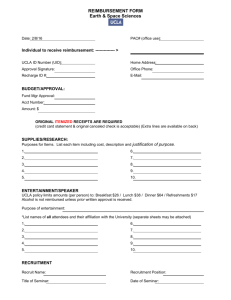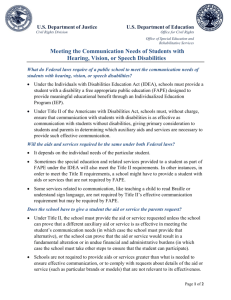Forest Grove School District v. T.A.
advertisement
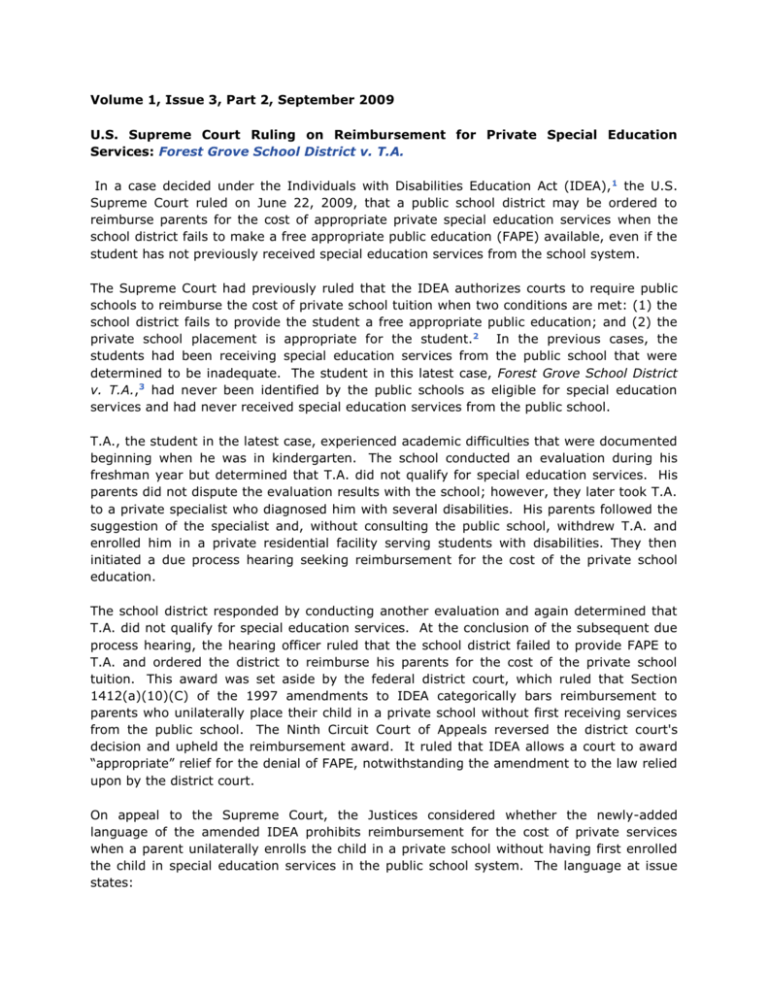
Volume 1, Issue 3, Part 2, September 2009 U.S. Supreme Court Ruling on Reimbursement for Private Special Education Services: Forest Grove School District v. T.A. In a case decided under the Individuals with Disabilities Education Act (IDEA), 1 the U.S. Supreme Court ruled on June 22, 2009, that a public school district may be ordered to reimburse parents for the cost of appropriate private special education services when the school district fails to make a free appropriate public education (FAPE) available, even if the student has not previously received special education services from the school system. The Supreme Court had previously ruled that the IDEA authorizes courts to require public schools to reimburse the cost of private school tuition when two conditions are met: (1) the school district fails to provide the student a free appropriate public education; and (2) the private school placement is appropriate for the student.2 In the previous cases, the students had been receiving special education services from the public school that were determined to be inadequate. The student in this latest case, Forest Grove School District v. T.A.,3 had never been identified by the public schools as eligible for special education services and had never received special education services from the public school. T.A., the student in the latest case, experienced academic difficulties that were documented beginning when he was in kindergarten. The school conducted an evaluation during his freshman year but determined that T.A. did not qualify for special education services. His parents did not dispute the evaluation results with the school; however, they later took T.A. to a private specialist who diagnosed him with several disabilities. His parents followed the suggestion of the specialist and, without consulting the public school, withdrew T.A. and enrolled him in a private residential facility serving students with disabilities. They then initiated a due process hearing seeking reimbursement for the cost of the private school education. The school district responded by conducting another evaluation and again determined that T.A. did not qualify for special education services. At the conclusion of the subsequent due process hearing, the hearing officer ruled that the school district failed to provide FAPE to T.A. and ordered the district to reimburse his parents for the cost of the private school tuition. This award was set aside by the federal district court, which ruled that Section 1412(a)(10)(C) of the 1997 amendments to IDEA categorically bars reimbursement to parents who unilaterally place their child in a private school without first receiving services from the public school. The Ninth Circuit Court of Appeals reversed the district court's decision and upheld the reimbursement award. It ruled that IDEA allows a court to award “appropriate” relief for the denial of FAPE, notwithstanding the amendment to the law relied upon by the district court. On appeal to the Supreme Court, the Justices considered whether the newly-added language of the amended IDEA prohibits reimbursement for the cost of private services when a parent unilaterally enrolls the child in a private school without having first enrolled the child in special education services in the public school system. The language at issue states: “If the parents of a child with a disability, who previously received special education and related services under the authority of a public agency, enroll the child in a private elementary school or secondary school without the consent of or referral by the public agency, a court or a hearing officer may require the agency to reimburse the parents for the cost of that enrollment if the court or hearing officer finds that the agency had not made a free appropriate public education available to the child in a timely manner prior to that enrollment.”4 The school district argued that because this section of the law only discusses reimbursement for children who have previously received special education services through the public school, IDEA only authorizes reimbursement in that circumstance. In reaching its decision in favor of the parents, the Court relied upon its decision in two previous cases: School Committee of Burlington v. Department of Education 5 and Florence County School District Four v. Carter.6 In those cases, the Court reasoned that the IDEA authorizes courts to fashion “appropriate” relief for violations of the FAPE requirement. Such relief should be determined in light of the Act’s broad purpose of providing children with disabilities a free appropriate education, including through publicly funded private placements when necessary. The Court determined that the 1997 IDEA amendments did not change the law’s purpose, and therefore, the reasoning of Burlington and Florence County applied to control the outcome of T.A.’s case. The Justices reasoned that the complete failure to create an IEP for T.A. was even more grievous a wrong than providing an inappropriate IEP to the plaintiffs in the Burlington and Florence County cases, making reimbursement an appropriate remedy even though T.A. never received public special education services. The Court dismissed the school district’s concerns that this outcome would encourage parents to choose private schools instead of working with public schools towards FAPE. The Court noted that parents who unilaterally place their children in private school do so at their own financial risk. They are entitled to reimbursement only when a federal court determines that the school has violated the IDEA and that the parents have placed the student in an appropriate school. In the Court’s view, the incidence of private school placement at public expense is “quite small.” This case underscores the need for school systems to remain diligent in their efforts to identify and provide appropriate services to students with disabilities. Failure to do so may result in the school system having to pay expensive private school tuition. 1 Individuals with Disabilities Education Act as amended, 20 U.S.C. 1400 et seq. (2008). School Committee of Burlington v. Department of Education, 471 U.S. 359 (1985); Florence County School District Four v. Carter, 510 U.S. 7 (1993). 2 3 Forest Grove School District v. T.A., 2009 U.S. LEXIS 4645 (2009). 4 Individuals with Disabilities Education Act, 20 U.S.C. 1412(a)(10)(C) (2008). 5 School Committee of Burlington, supra. 6 Florence County School District Four, supra.
